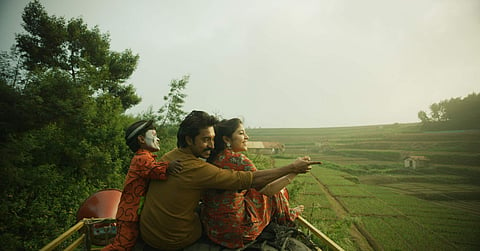Mehandi Circus Review: A pleasant no-frills love story
Rating:(3 / 5)
Mehandi Circus is written by Cuckoo-fame Raju Murugan. It is always comforting to enter a world created by the writer-filmmaker. Although we are made aware of the various evils lurking around the corner, the refreshing lives of the inhabitants of his world keep us optimistic. Their futures might be bleak, but the present is anything but.
Though Mehandi Circus, directed by debutant Saravana Rajendran, begins in the year 2010, the film is set in the early nineties--1992, to be precise--and has the sensibilities of Tamil cinema from the 80s. And what better way to establish the era than with Ilaiyaraaja's music?
Director: Saravana Rajendran
Cast: Shweta Tripathi, Madhampatty Rangaraj, Vela Ramamoorthy, RJ Vigneshkanth
Jeeva (Madhampatty Rangaraj) owns an audio cassette shop, Raja Geetham, and also doubles up as the local Cupid by creating mixtapes to facilitate romance among the townsfolk. No prizes for guessing whose songs he uses for this purpose. However, for wooing the girl he loves, Jeeva chooses composer Ravi's Yeh Raatein Yeh Mausam, an evergreen Kishore Kumar number from Dilli ka Thug. You see, the love of his life, Mehandi (Shweta Tripathi), is a Hindi-speaking girl, who is part of a small travelling circus named after her. Jeeva falls in love the very first time he sets eyes on Mehandi. He sees her being used as the human target in a knife-throwing act, and tries his best to get her out of this dangerous existence, saying lines like, "Nee seththu pona, naanum dhaane saaganum"
While such scenes and dialogues do belong in a bygone era, interestingly, it is not these words that make Mehandi reciprocate Jeeva's pining love for her. It is how his actions remind her of an epic folktale narrated by her grandmother about a prince who rescues a princess from a Mongolian king. It is with this epic that the film begins, and it remains faithful to it until the end, with a twist here, a turn there, and a whole lot of Ilaiyaraaja and Sean Roldan in between.
Shweta makes a very assured Tamil debut, and Mehandi's characterisation--being non-native, she only speaks halting Tamil--enables her to dub for herself. An excellent example of intelligent casting of an actor who doesn't speak the language. The Masaan actor is, undoubtedly, the heart and soul of this film, and it is through her expressive eyes, unfiltered smiles, restricted tears, and longing glances that the story unfolds. Rangaraj, on the other hand, doles out a strictly functional performance in a role that needed more nuance, while the supporting characters, barring Vela Ramamurthy, are all one-note. Be it Marimuthu as a caste-crazy father, or RJ Vigneshkanth, who, of course, plays the hero's friend, they are painfully clichéd.
Some scenes also feel out of place, especially when Mehandi Circus veers into preachy territory, but the director thankfully cuts this short to bring the focus back to the Jeeva-Mehandi story. This story is narrated in a back-and-forth way, shifting across three decades and multiple locations. With the direction being slightly off-key at places, and the story not having enough juice to keep a smartphone-toting audience invested, it is Sean's music that holds the film together. Not just his effective background score, but the songs too — especially Pradeep Kumar's Kodi Aruvi and Vellaatu Kannazhagi sung by Sean himself — makes us understand the oft-heard comparisons of this composer to the maestro.
The dialogues too strike the right chord. "Parambara thozhil... Vazhi vazhiya vandhadhu idhu... Pasiyum apdi dhaane," says a daredevil circus artiste when asked why he continues to perform in the circus. The film is peppered with such writing. The other place where Mehandi Circus scores full points is the cinematography by Selvakumar SK, which showcases the lush locales of Poombarai, the cramped spaces of Mumbai, and the dusty lanes of Karnataka in all their splendour and ordinariness.
The central plot is a reimagining of the folktale which kickstarts proceedings, but this story about two star-crossed lovers doesn't aim too high. It doesn't want to be an epic, nor does it want to remain a generic tale of love and loss; it places itself somewhere in between. Though the pleasant Mehandi-Jeeva story is the crux of the film, there's also an undercurrent of caste and class commentary.
What Mehandi Circus will really be remembered for though is the Ilaiyaraaja nostalgia it heavily leans on. Be it in the usage of O Paapa Laali from Geethanjali or Kannamma from Vanna Vanna Pookal, the film reminds you of a time when Ilaiyaraaja, and only Ilaiyaraaja, ruled our hearts. But is that time truly only a thing of the past? As the Isaignani himself sang in the 1985 film, Aanpaavam, "Intha kala ilaignar seyyum kadhalukku, Ilaiyaraaja enthan pattirukku..." We are now in 2019, 34 years since he rendered those lines, and it still rings loud, clear, and true.

